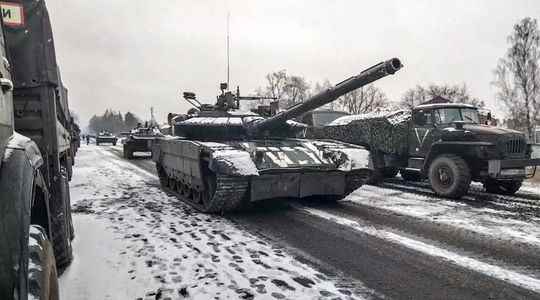With the onset of the cold season, the battlefield will profoundly change in Ukraine. The sticky mud of the raspoutitsa linked to the intense autumn rains will be followed by the biting cold of the winter period, which can easily reach -20°C at nightfall. Data that will have a direct impact on the operations carried out by both the Russian and Ukrainian armies. “These two phenomena will not prevent the fighting, but will slow it down,” warns Yohann Michel, researcher on defense issues at the International Institute for Strategic Studies (IISS). Evolving in this environment is more complex, which de facto increases travel times.”
The mud, at first, could represent a major challenge for the forces of kyiv engaged in several counter-offensives to retake territories controlled by the Russians. But thanks to the drop in temperatures and the freezing of the soil, the trend could be reversed. “On the Russian side, there are questions about what will happen to the front given the miserable conditions already complained of by the conscripts, who are left without adequate equipment or supplies and are left to their own devices by absent commanders”, points out in a recent note Lawrence Freedman, Emeritus Professor of War Studies at King’s College London.
On social networks, numerous videos have flourished in recent weeks in which freshly mobilized Russian soldiers complain of deplorable living conditions and unsuitable, or even non-existent, equipment. Logistical difficulties that are all the more problematic in very cold weather. “When temperatures reach -15°C, it simply becomes vital to have suitable equipment and regular and preferably hot nutritional intake, explains Yohann Michel. This could be a handicap for Russians given their current supply difficulties.”
Paramount adaptability
Conversely, Ukraine can count on strong Western support in this area. “Our task is to enable them to carry out meaningful operations throughout the winter and to continue to supply them with fuel, winter clothing, tents, advanced weapon systems, air defense, armored vehicles and advanced artillery” , declared NATO Secretary General Jens Stoltenberg on October 13 after a meeting of Alliance Defense Ministers in Brussels. On this occasion, Canada notably announced the forthcoming delivery of 500,000 winter garments, including gloves, boots, parkas and trousers.
Many other countries have done the same, such as Lithuania, which will fully equip 25,000 Ukrainian soldiers, or Germany, which has already provided hundreds of thousands of jackets and trousers. “I expect Ukraine to continue to do everything it can through the winter to regain its territory and be effective on the battlefield,” US Secretary of Defense Lloyd Austin. And we’re going to do everything we can to make sure they have what it takes to be effective.” Especially since beyond the outfits, it is also the question of camouflage that arises. “We don’t camouflage ourselves in the same way in the forest when the leaves fall,” notes Yohann Michel.
Vehicles are not spared by the change of season either. “Vehicle mobility is problematic, recently came up former Australian general Mick Ryan, a keen observer of the war in Ukraine. Wheeled vehicles in particular struggle in cold or swampy conditions, which will impact logistical support on both sides.” Which can further lead to them traveling only on roads and exposing themselves more at risk of ambush.” Equipment becomes more difficult to maintain and operate. Fuel requirements are increasing to run the generators,” adds Lawrence Freedman, emphasizing once again the crucial role of logistics.
Ultimately, the capacity of the two armies to adapt to this new environment will be decisive. “The Russians have had difficulty since the beginning of this conflict to learn from their setbacks and to adjust their military apparatus, summarizes Yohann Michel. So one can wonder if they will really be able to show the same capacity for adaptation than Ukrainians in the cold season.” General Winter might not be on Moscow’s side this time.
